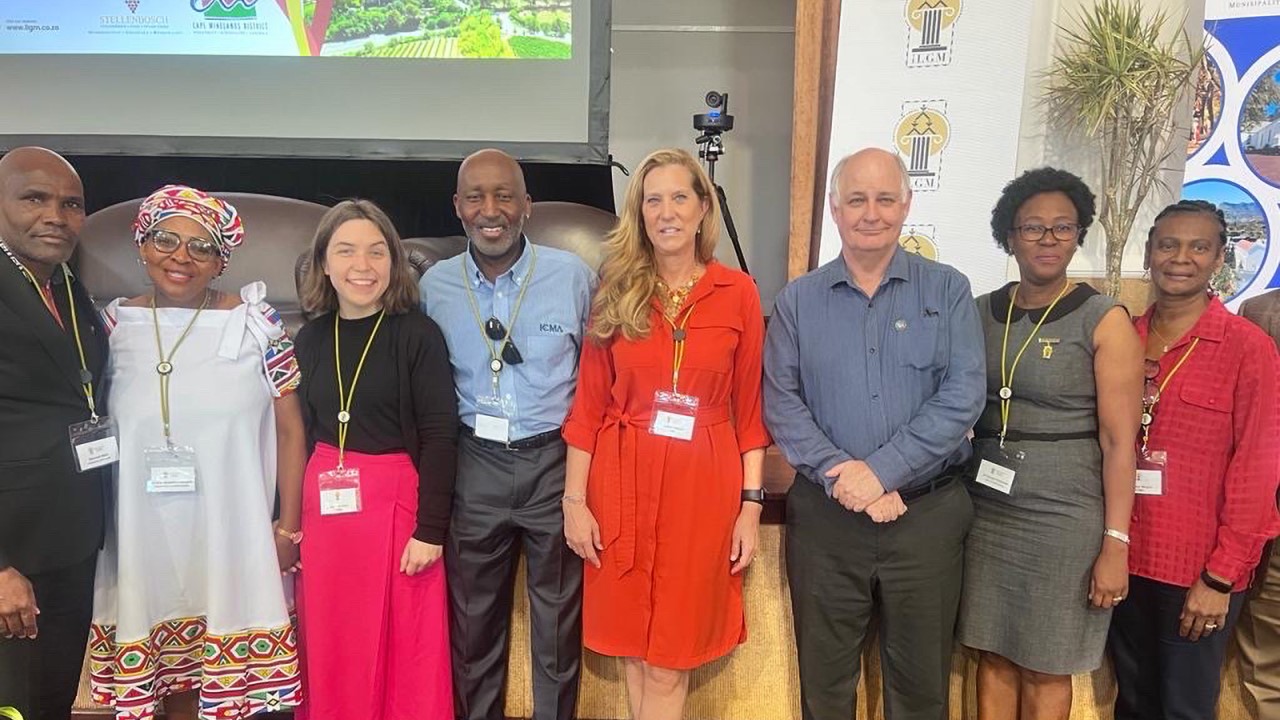
During the 2023 Institute of Local Government Management (iLGM) Conference in Franschhoek, South Africa, ICMA representatives participated in knowledge exchange with local government professionals from all regions of South Africa. Serving as the professional body in South Africa and one of ICMA’s International Affiliates, iLGM hosted an eye-opening conference that highlighted the similarity of issues faced by local governments around the world. While local government has only been part of the national constitution since the enactment of the Municipal Structures Act in 1998, there are many parallels to be drawn between the workings of government in South Africa, the United States, and around the world.
As a local government professional, do any of these questions sound familiar to you?
- Are you recruiting the right professionals or are you succumbing to outside pressures?
- How do we keep talent in local government?
- How can local government use technology to ensure data-driven decision making?
- How do we keep political interference out of local government management and behave in an ethical manner?
- How do we manage infrastructure challenges to create a thriving community?
These are just a few of the questions that local government professionals in South Africa are continually asking. Below are some observations from discussions held during the iLGM Conference that will resonate with local government professionals and their staff around the world.
Hire Well and Provide Opportunities for Growth
In South Africa, like in most places, public service is a very demanding job. It comes with long hours and a need to understand a fair amount about all the different aspects of local government operations to effectively serve the needs of the community. Couple this with low pay, in comparison to private sector jobs, and the result is a recruitment problem. Much of the country’s top talent does not consider a career in public service. If they do, they often leave for the private sector due to higher pay and better benefits. This rings true in many countries throughout the world. In the session, “New and Better Hiring Practices for Local Government,” discussions revolved around not only finding the right people but also convincing them to stay. Some suggestions included revisiting hiring practices to ensure a diverse candidate pool, creating opportunities for promotion from within, and working toward better pay.
Although better pay was acknowledged as the primary way to retain local government professionals, some other suggestions included deemphasizing titles and focusing on attitudes, ethics, and skills when considering staff members to take on various projects in the municipality. While some tasks may need to be reserved for specific roles, there are often opportunities for local government professionals to take on projects of interest and grow as leaders in the field, regardless of their position. This serves two purposes. First, the project is completed by staff members who are interested in the issue at hand and have the capacity to see it through. Second, the employee benefits through gaining new skills. This helps the employee feel more engaged in their work and increases their likelihood of remaining in local government. These ideas can be applied to municipalities all over the world as local governments in many countries face issues of low pay and difficulties with recruitment and retention.
Making Technology and Data Work for You
Technological advances are occurring at lightning speed and local governments need to keep up in order to be able to effectively manage their municipalities and meet their goals of excellence in service delivery. Dr. Silma Koekemoer, director, Ayema Xpertix Consulting and presenter at the iLGM Conference, noted, “Data is the currency of the future.” However, many municipal officials and staff in South Africa, as in other parts of the world, do not even know what data is being gathered. To make effective, data-driven decisions, municipalities need to look at the data they have and learn how to correctly interpret it to best serve community needs. Better data analysis can also have secondary benefits such as improved financial management and more effective allocation of staff resources.
Dr. Koekemoer proposed the “triangle of IT” made up of data, technology, and processes. Once you have the data, you need to have the processes in place to interpret it and the technology available to store and manipulate it, as well as act on its results. On top of the triangle, local governments need strategies and policies that help to inform the data, technology, and processes. After reviewing all of this, the question to consider is, “Are these processes helping or hurting your community?”
This triangle of IT can be applied to municipalities all over the globe, not just in South Africa, as technology, data, processes, strategies, and policies are universal aspects of local government management regardless of location, form of government, or other factors.
Solving Infrastructure Challenges to Allow for Economic Development
Local government professionals can agree that economic development is central to the vitality and sustainability of a community. So, what do you do when infrastructure challenges deter community investment and development? This is the question facing municipal managers in South Africa and around the world. Attendees generally agreed that many municipalities had to “go back to the basics” and provide potable water and stable electricity to residents while also ensuring roads were properly built and maintained to facilitate transportation. Without this, businesses will be unlikely to see the community as a desirable place and economic development will suffer. They noted that sometimes, as local government professionals, they find themselves so caught up in politics or mandates from the national government that they can forget about the basics of providing excellent service delivery. Ultimately, this makes the municipality less financially stable and more difficult to manage. Remembering that the core function of local government is serving the community will ensure that residents have a good quality of life.
Developing Accountable Leaders to Improve Municipal Stability
To face all of these challenges, participants emphasized the need for responsible leadership and consequence management. They defined responsible leadership as including ethics, morals, consultation, and consideration for serving all members of a community. This means that leaders may have to take unpopular stances, stand up to political pressure, and work together to reach a compromise. When it comes to consequence management, participants noted that there are often no consequences for poor actions. For example, a grant is given but the funds are misused, or someone violates the code of conduct, but nothing is done about it, so this encourages poor processes to continue. To create thriving and sustainable municipalities, leaders need to be held responsible for their actions and behave in ways aligned with responsible leadership.
Policies and structures need to be established and training needs to be provided on these established practices to create an overall system of accountability and professionalization. The welcome remarks challenged local government professionals to work hard to change the direction of their municipalities. It is the leadership that will set the tone for how municipalities are managed, leading to better planning, budgeting, staffing models, and ultimately, create better communities.
While political or environmental constraints may make for different local contexts, the issues facing local governments in South Africa are not all that much different from issues facing local governments in the United States. Many communities in the Unites States are faced with political infighting, infrastructure issues, challenges around advances in technology, and a continued need for professional development. Local government professionals around the world can benefit from building relationships and working together to solve common challenges while continuing to develop good local governance practices.
For more information, or to be connected with iLGM, please contact global@icma.org to get in touch with ICMA’s global engagement team.

JEANETTE GASS is senior program manager of global engagement at ICMA (jgass@icma.org).
New, Reduced Membership Dues
A new, reduced dues rate is available for CAOs/ACAOs, along with additional discounts for those in smaller communities, has been implemented. Learn more and be sure to join or renew today!
